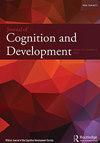The Role of Intentionality in Infants’ Prediction of Helping and Hindering
IF 2.1
2区 心理学
Q3 PSYCHOLOGY, DEVELOPMENTAL
引用次数: 1
Abstract
ABSTRACT The present research examined whether U.S. infants can recognize in others a pattern of helping or hindering after watching such behaviors across multiple scenarios. Infants at 17 months watched three familiarization events in which a person (recipient) failed to achieve various goals and another person (actor) always helped or hindered the recipient. In test, infants saw two events in yet another different scenario. In one event, the actor behaved consistently as before; in the other event, the actor behaved in the opposite way. In Experiment 1, the infants expected the helper to help the recipient again and were intrigued, as indicated by their prolonged looking, when the helper hindered the recipient. However, the infants did not form a clear expectation about the hinderer and looked equally at the two test events. Experiment 2 showed that when the intention to hinder was made more salient in familiarization, infants expected the hinderer to continue behaving so. Together, the present results underscore the role of intentionality in the process by which infants develop an expectation of others’ tendency to help or hinder another person.意向性在婴儿帮助和阻碍预测中的作用
摘要本研究考察了美国婴儿在多个场景中观察到帮助或阻碍他人的行为后,是否能识别出这种模式。17个月大的婴儿观看了三次熟悉事件,其中一个人(接受者)未能实现各种目标,而另一个人(行动者)总是帮助或阻碍接受者。在测试中,婴儿在另一个不同的场景中看到了两个事件。在一个事件中,演员的行为和以前一样始终如一;在另一个事件中,演员的行为正好相反。在实验1中,婴儿期望帮助者再次帮助接受者,当帮助者阻碍接受者时,他们的目光延长,这表明他们很感兴趣。然而,婴儿们并没有对阻碍者形成明确的期望,他们对这两个测试项目的看法相同。实验2表明,当阻碍的意图在熟悉过程中更加突出时,婴儿希望阻碍者继续这样做。总之,目前的结果强调了意向性在婴儿对他人帮助或阻碍他人的倾向产生期望的过程中的作用。
本文章由计算机程序翻译,如有差异,请以英文原文为准。
求助全文
约1分钟内获得全文
求助全文
来源期刊

Journal of Cognition and Development
Multiple-
CiteScore
4.00
自引率
0.00%
发文量
29
期刊介绍:
The Journal of Cognition and Development is the official journal of the Cognitive Development Society (CDS). Some CDS members are concerned with basic research or theory; others focus on policy issues and practical applications. The range of interests includes cognitive development during all stages of life, and we seek to understand ontogenetic processes in both humans and nonhumans. Finally, their interests encompass typical as well as atypical development, and we attempt to characterize both biological and cultural influences on cognitive change and continuity.
 求助内容:
求助内容: 应助结果提醒方式:
应助结果提醒方式:


